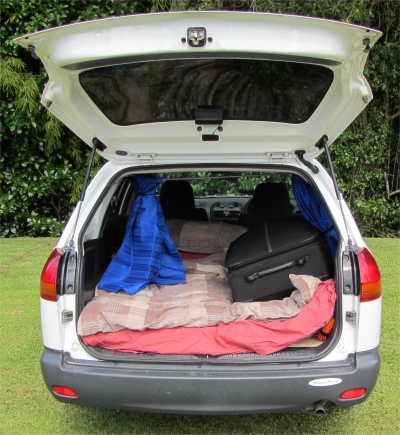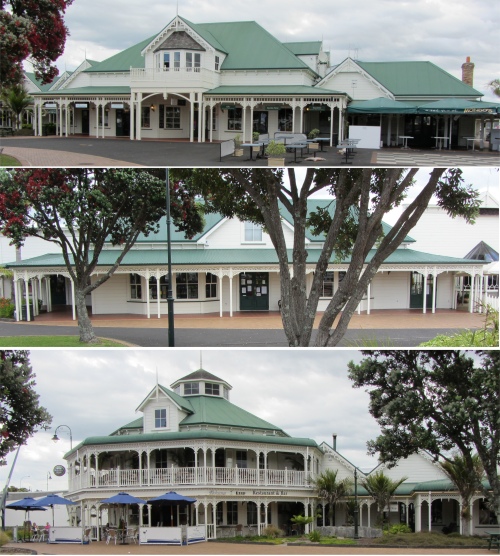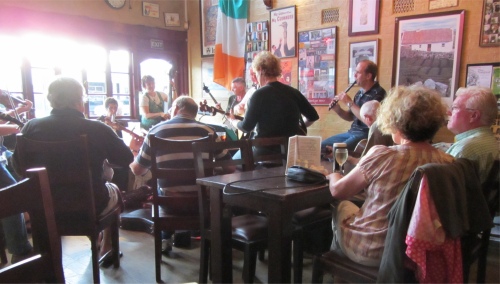A party of primary school kids were gathered near the water's edge, shouting encouragement to their team mates. It seemed a relay race was underway, with pairs of kids racing out into the surf with their body boards, paddling out to an unseen marker, where they would turn around and surf back ashore. What an idyllic world for these youngsters.
Once I had soaked up the atmosphere and savoured the salty air, I drove the last few kilometres into Whangarei, stopping off at an information centre. I explained to the young girl on the reception desk about my bewilderment with the toll fee. She laughed, many people miss it. I was meant to pull in at a certain petrol station and pay at a machine there. Obviously! She gave me a mass produced leaflet, the same that is given out to endless people, which explained how I could pay retrospectively. I have four days grace.
Whangarei is situated on the inner reaches of Whangarei Harbour on the banks of the Hatea River, and is New Zealand's northern-most city. The first European settler was William Carruth, a Scotsman and trader who arrived in 1839, bought land from the Maori, and settled at the mouth of the Hatea River. He was joined, six years later, by Gilbert Mair and his family. Relations between settlers and local Maori were friendly, but broke down in February 1842, when all settler farms were plundered in revenge for transgressions of tapu by one. In April 1845, during the Flagstaff War, all settlers fled from Whangarei. By the mid-1850s there were a number of farmers and orchardists in the area. From 1855, a small town developed, driven by the kauri gum trade. Today's Town Basin on the Hatea River was the original port, and early exports included kauri gum and native timber followed later by coal from Whau Valley, Kamo and Hikurangi. The nucleus of the town was established by the mid-1860s, though surprisingly, road and rail links with Auckland were not completed until the 1930s.

My New Horizontal Home
|
I picked up a list of campsites, chose one about 15 minutes walk out of town, and made straight for it. I wanted to sort out the sleeping and storage arrangements in the back of my car. I arrived at the campsite reception, enquired of the cost, considered it reasonable, and checked in. Two women operated the reception. The one glued to a computer screen piped up, "For how many people?". "Just me," I replied. "Ah, you're on your own." "Unless you want to join me," I joked. At that, both the women burst into fits of laughter. The poor foreign chap, who was being checked in at the time, was totally bemused by this sudden mirth. The woman I had been speaking to was normally never short for words, but on this occasion she was.
Once they had calmed down, the other lady went through the check in process with me. She seemed to have a familiar accent, and on probing, I discovered she was from Redcar, the north east of England. Once they learned I was from East Anglia, the other woman said she had lived in Ipswich for two years while her husband studied at the college. She had now been living in New Zealand for seven years.
I parked my car on the patch of manicured grass they had allocated to me, and I then spent an age making my bed and trying to fit everything else around the bed, behind seats and anywhere I could find. From my experiences last year, it was crucial to have an efficient system, and work on the basis that everything has its place. I had less room in this car, and I would need to spend a night in it before I could fine tune the arrangements. Dressing, undressing etc. would all have to be done in the horizontal position.
Once I had arrived at a half decent solution, I went off to buy provisions. I noticed on the drive up the almost non-existence of food stores by the highway. New Zealand seems to opt for the small store model, and it was one such store where I made my purchases. The shop functioned in an easy going laid-back mode. The old man who served me commented on the heat today. I mentioned the rain down in Auckland this morning, and then detected a subtle change in his attitude; I must have gone down in his estimation due to my contamination from the big city. "We want the rain, it's too dry up here," he snapped. He then seemed to mellow, "Do you want a couple of bags or would you prefer a box?", he asked. I indicated the latter. "You travelling?", he enquired. I nodded. "You've come here to escape the British winter," was his full stop to the conversation, or maybe it was his idea of a joke.

Town Basin Buildings
|
With shopping out of the way, I walked into town, tracking a gulf of vegetation on my left. The gulf was deep and dark due to the dense canopy above. Exotic trees and giant ferns dominated the gulf, the sort of vegetation you'd expect to be turned into a coal seam in a few hundred million years. The gulf became a river that flowed through the town. Soon I arrived at the focal point known as the Town Basin, a lively waterfront development, which has yachties from around the world mooring here to soak up the semi tropical climate and explore the stunning coastline of Northland. The locality is twee and touristy with a cluster of cafes, restaurants, galleries and craft shops. There is an interesting glass and ceramics studio, the Burning Issues Gallery, where craftsman can be watched going about their business. New Zealand's largest sundial fronts Clapham's Clocks, another attraction. An Englishman, Archibald Clapham, started off the collection, which has now grown to become the National Clock Museum.
I reconnoitred the restaurants around the basin, and chose the one which was by far the most popular. The young fellow serving me strove to be too nice, something which I am not too comfortable with. He had an accent I could not place, so I asked him where he hailed from. "Oh, I have lived here all my life, sir," was his impeccable reply. "Many people think I am English. My father took great pains to make me speak articulately," he added. He had a touch of Stephen Fry about him. After my meal, I sipped a beer as I made my notes. I became aware that I was surrounded by English couples, all wrapped up in their own little worlds, unaware of the existence of the other English couples around them.
Once suitably re-vitalised, I strolled into the heart of the city, passing an ugly sprawl of retail outlets, very similar to the chaotic layouts I had come across in America. The city centre comprised just compact streets of shops with very little soul. It was 19:30, and the place was deserted, the only sign of life emanating from the innards of a few bars.
Whilst passing one of the bars, McMorrissey's, I spied a group of musicians getting setting up their instruments to perform a gig. It was a folk group consisting of a dozen players with guitars, violins, base, drums, pipes, banjos, bagpipes, mouth organs, and all in good singing voice. I stepped in, bought a beer, and soaked up the musical atmosphere. Soon there were more musicians pouring in, and the bar was becoming standing room only. Most of the band were Irish, and I could have been in a bar in Dublin. Soon a lively gig was being played, with one of the customers even performing Irish dancing. Who would have thought it in this almost antipode of their homeland.

McMorrissey's Gig
|
I bumped into a young chap, who I got talking to. By sheer coincidence he came from Kirby Lonsdale, from the county of my birth. He was up here visiting a friend, but could normally be found working in Frederick's Bar in New Plymouth on the North Island. He asked me to pop in if I'm ever out there. What a small world it is. Half a million New Zealanders are out of the country doing their Overseas Experience stint, and seem to have been replaced by Britons.
As I made my way back through the town centre towards the campsite, I walked past a huge shopping arcade, I paused a while in my T-shirt and shorts listening to Christmas Carols being played out over the tanoy system. The streets were deserted and there was very little road traffic at this time of night, 22:30. I reached my car, and settled down for the night. Bizarrely, it was as if I had just taken a couple of weeks break since my previous long trek around the Rockies. I soon fell into a refreshing sleep.





